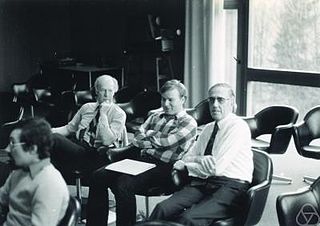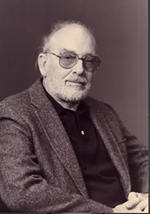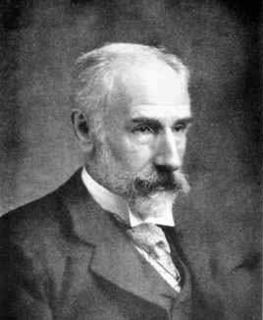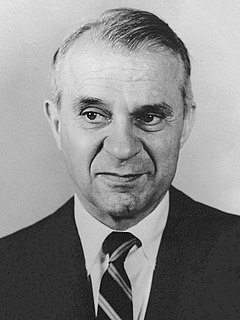 W
WCharalambos Dionisios Aliprantis was a Greek-American economist and Mathematician who introduced Banach space and Riesz space methods in economic theory. He was born in Cefalonia, Greece in 1946 and immigrated to the US in 1969, where he obtained his PhD in Mathematics from Caltech in June 1973.
 W
WMaurice Félix Charles Allais was a French physicist and economist, the 1988 winner of the Nobel Memorial Prize in Economic Sciences "for his pioneering contributions to the theory of markets and efficient utilization of resources", for Maurice Allais contribution, along with John Hicks and Paul Samuelson, to neoclassical synthesis. They formalize the self-regulation of markets, that Keynes refuted, while reiterating some of his ideas.
 W
WKenneth Joseph Arrow was an American economist, mathematician, writer, and political theorist. He was the joint winner of the Nobel Memorial Prize in Economic Sciences with John Hicks in 1972.
 W
WYves Balasko is a French economist working in England. He was born in Paris on August 9, 1945 to a Hungarian father and a French mother. After studying mathematics at the École Normale Supérieure in Paris he became interested in economics. He subsequently spent six years at Électricité de France where he was involved in the application of the theory of marginal cost pricing to electricity pricing. While at Électricité de France, he proved his first results on the structure of the equilibrium manifold in the theory of general equilibrium. After completing his dissertation on "L'équilibre économique du point de vue differentiel", he had positions at the Universities of Paris XII, Paris I, Geneva and York. In 2013, he held a visiting scholar position at Pontifical Catholic University of Rio de Janeiro, in Brazil. Since 2014, he has returned to York University.
 W
WDavid Cass was a professor of economics at the University of Pennsylvania, mostly known for his contributions to general equilibrium theory. His most famous work was on the Ramsey–Cass–Koopmans model of economic growth.
 W
WGeorge Bernard Dantzig was an American mathematical scientist who made contributions to industrial engineering, operations research, computer science, economics, and statistics.
 W
WGérard Debreu was a French-born economist and mathematician. Best known as a professor of economics at the University of California, Berkeley, where he began work in 1962, he won the 1983 Nobel Memorial Prize in Economic Sciences.
 W
WFrancis Ysidro Edgeworth was an Anglo-Irish philosopher and political economist who made significant contributions to the methods of statistics during the 1880s. From 1891 onward, he was appointed the founding editor of The Economic Journal.
 W
WDavid Gale was an American mathematician and economist. He was a professor emeritus at the University of California, Berkeley, affiliated with the departments of mathematics, economics, and industrial engineering and operations research. He has contributed to the fields of mathematical economics, game theory, and convex analysis.
 W
WFrank Horace Hahn FBA was a British economist whose work focused on general equilibrium theory, monetary theory, Keynesian economics and monetarism. A famous problem of economic theory, the conditions under which money can have a positive value in a general equilibrium, is called "Hahn's problem" after him.
 W
WSir John Hicks was a British economist. He is considered one of the most important and influential economists of the twentieth century. The most familiar of his many contributions in the field of economics were his statement of consumer demand theory in microeconomics, and the IS–LM model (1937), which summarised a Keynesian view of macroeconomics. His book Value and Capital (1939) significantly extended general-equilibrium and value theory. The compensated demand function is named the Hicksian demand function in memory of him.
 W
WWerner Hildenbrand is a German economist and mathematician. He was educated at the University of Heidelberg, where he received his Diplom in mathematics, applied mathematics and physics in 1961. He continued his education at the University of Heidelberg and received his Ph.D. in mathematics in 1964 and his habilitation in economics and mathematics in 1968.
 W
WLeonid Vitaliyevich Kantorovich was a Soviet mathematician and economist, known for his theory and development of techniques for the optimal allocation of resources. He is regarded as the founder of linear programming. He was the winner of the Stalin Prize in 1949 and the Nobel Memorial Prize in Economic Sciences in 1975.
 W
WTjalling Charles Koopmans was a Dutch-American mathematician and economist. He was the joint winner with Leonid Kantorovich of the 1975 Nobel Memorial Prize in Economic Sciences for his work on the theory of the optimum allocation of resources. Koopmans showed that on the basis of certain efficiency criteria, it is possible to make important deductions concerning optimum price systems.
 W
WOskar Ryszard Lange was a Polish economist and diplomat. He is best known for advocating the use of market pricing tools in socialist systems and providing a model of market socialism. He responded to the economic calculation problem proposed by Ludwig von Mises and Friedrich Hayek by claiming that managers in a centrally-planned economy would be able to monitor supply and demand through increases and declines in inventories of goods, and advocated the nationalization of major industries. During his stay in the United States, Lange was an academic teacher and researcher in mathematical economics. Later in socialist Poland, he was a member of the Central Committee of the Polish United Workers' Party.
 W
WWassily Wassilyevich Leontief, was a Soviet-American economist known for his research on input–output analysis and how changes in one economic sector may affect other sectors.
 W
WEdmond Malinvaud was a French economist. He was the first president of the Pontifical Academy of Social Sciences.
 W
WAndreu Mas-Colell is a Spanish economist, an expert in microeconomics and one of the world's leading mathematical economists. He is the founder of the Barcelona Graduate School of Economics and a professor in the department of economics at Pompeu Fabra University in Barcelona, Catalonia, Spain. He has also served several times in the cabinet of the Catalan government. Summarizing his and others' research in general equilibrium theory, his monograph gave a thorough exposition of research using differential topology. His textbook on microeconomics, co-authored with Michael Whinston and Jerry Green, is the most used graduate microeconomics textbook in the world.
 W
WHerbert Eli "Herb" Scarf was an American mathematical economist and Sterling Professor of Economics at Yale University.
 W
WStephen Smale is an American mathematician, known for his research in topology, dynamical systems and mathematical economics. He was awarded the Fields Medal in 1966 and spent more than three decades on the mathematics faculty of the University of California, Berkeley.
 W
WMarie-Esprit-Léon Walras was a French mathematical economist and Georgist. He formulated the marginal theory of value and pioneered the development of general equilibrium theory. Walras is best known for his book "Éléments d'économie politique pure.", a work that has contributed greatly to the mathematization of economics through the concept of general equilibrium. The definition of the role of the entrepreneur found in it was also taken up and amplified by Schumpeter.